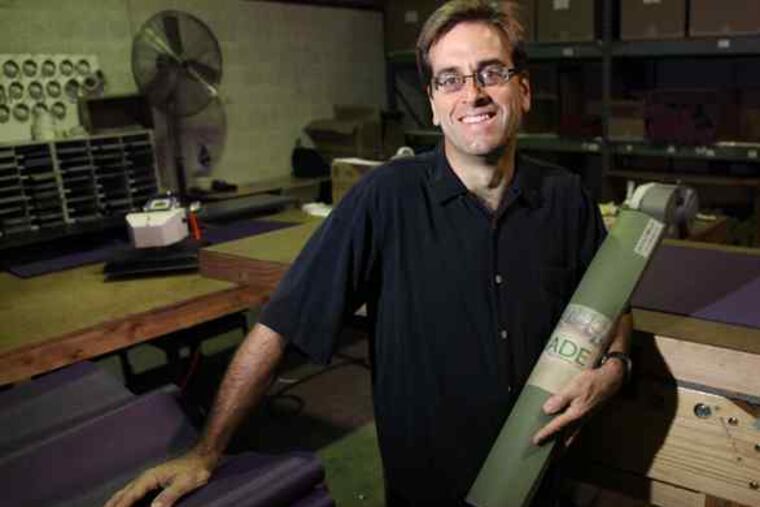Conshohocken manufacturer finds yoga helps soothe economy's sting
As the region stumbles around in a recession hangover, Dean Jerrehian is an odd assemblage of calm, cheerfulness, and optimism for a guy making a living in one of the economy's hardest-hit sectors - manufacturing.

As the region stumbles around in a recession hangover, Dean Jerrehian is an odd assemblage of calm, cheerfulness, and optimism for a guy making a living in one of the economy's hardest-hit sectors - manufacturing.
He credits yoga. No, not his practice of it, though he does an impressive downward dog.
Jerrehian's happy place is the result of an estimated 500,000 to a million people around the world trying to get to that place stretching, meditating, and deep breathing while perched on the natural-rubber yoga mats produced by Jerrehian's JadeYoga in Conshohocken.
Those mats now sell in 50 countries and account for half of his company's sales and revenue. The rubber is tapped from trees on plantations in Vietnam.
How a rug company with Philadelphia origins dating from 1916 evolved into what is now a steadily growing (it is even hiring!) green business specializing in eco-friendly exercise mats is a story with a lesson Jerrehian said all business owners would be wise to heed:
Never blow off a suggestion.
When Jerrehian Brothers was founded by Aram Jerrehian, Dean's grandfather, on Walnut Street, the business offered rug cleaning, renovating, and repair. It later started collecting rugs.
Dean's father, Aram Jr., took over the company in the mid-1960s, renaming it Jade Industries and expanding into production of rug padding made of natural rubber. By the late 1980s, Jade was exclusively in the padding business.
Dean Jerrehian joined the company in 1998, after seven years as a lawyer for the Environmental Protection Agency. There, he had fought against incinerators that polluted and for cleanup of Superfund sites.
"Tired of fighting with people," he went home to join the family business. Ironically, it was also to take up another fight. His son Matt had been born with a disorder that prevented him from properly metabolizing protein. Because Matt had been tested for the disorder, phenylketonuria, or PKU, at birth, he was treated immediately and the 17-year-old has led a healthy life.
Other children were not so lucky, Jerrehian said. They lived in states that did not require testing of newborns for PKU. By leaving the EPA, Jerrehian was free to lobby for more proactive testing, which has resulted in more states requiring it, he said.
Meanwhile, the rug-padding business was helping pay the household bills. In 2000 came the suggestion from "a very savvy yogi," as Jerrehian described him, and it was advice he did not ignore: "There's a big problem in the yoga world - yoga mats are really slippery."
That's because they were largely made of plastic. Jerrehian decided to try rubber. In the last 18 months or so, he has gained about four competitors - none manufactured in the United States, Jerrehian said.
"I have to admit I didn't take it all that seriously in the beginning," he said last week at JadeYoga, which recently launched two other green lines: organic-cotton yoga blankets and yoga blocks made of balsa wood.
The 49-year-old Chestnut Hill resident said he "knew we were definitely onto something" with the rubber mats when 300 calls for orders followed distribution of 500 sample mats, mostly to yoga studios.
Jade Industries' yoga-mat division has grown from one-half of 1 percent of the company's sales that first year to the 50 percent of sales and revenue it accounts for now.
That's without a dedicated sales force, and with little presence in sporting-goods or health stores - where Jerrehian plans future efforts. He's also exploring iPhone applications and a Facebook push.
Jerrehian would not release additional financial details on the company, which has 10 employees. But he did describe the manufacturing process: After the rubber is harvested from the Vietnamese plantations, it is reduced to a solid and sent by container ship to a factory in Moosup, Conn., where it is further processed into sheets that are sent to JadeYoga. In Conshohocken, those sheets are cut into yoga mats and packaged for sale.
For every yoga mat sold, the company plants a tree through Trees for the Future.
That the mats are eco-friendly "makes me feel good," said Jerrehian, a vegetarian who bikes to work when practicable. It also drives up their cost substantially. Jade mats sell for $60 each - at least three times the price of a plastic alternative.
Melanie Smith, owner of Yogaphoria in New Hope, said synthetic mats were a distraction in yoga - "icky under my hands, or too slippery or too hard."
With Jade mats, yoga practitioners "and the mat are from God and there's a resonance there," Smith said.
Bobbi Tighe, owner of Chestnut Hill Yoga and a fan of the Jade mat but not the price, said she was hoping for "more econ-eco mats in the near future."
"We must remember the great yogis of India from times gone by practiced on the clay earth," she wrote in an e-mail. "Maybe the next evolution of yoga mats will be the Mad Max compact-dirt floors."